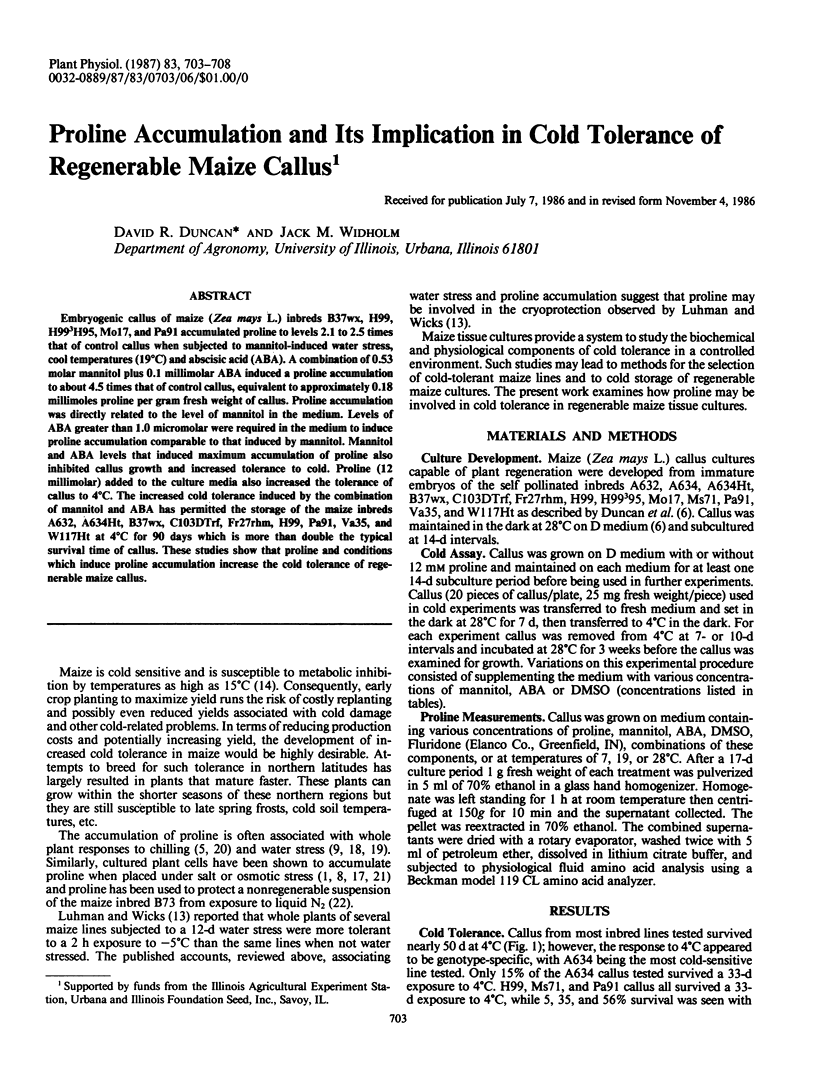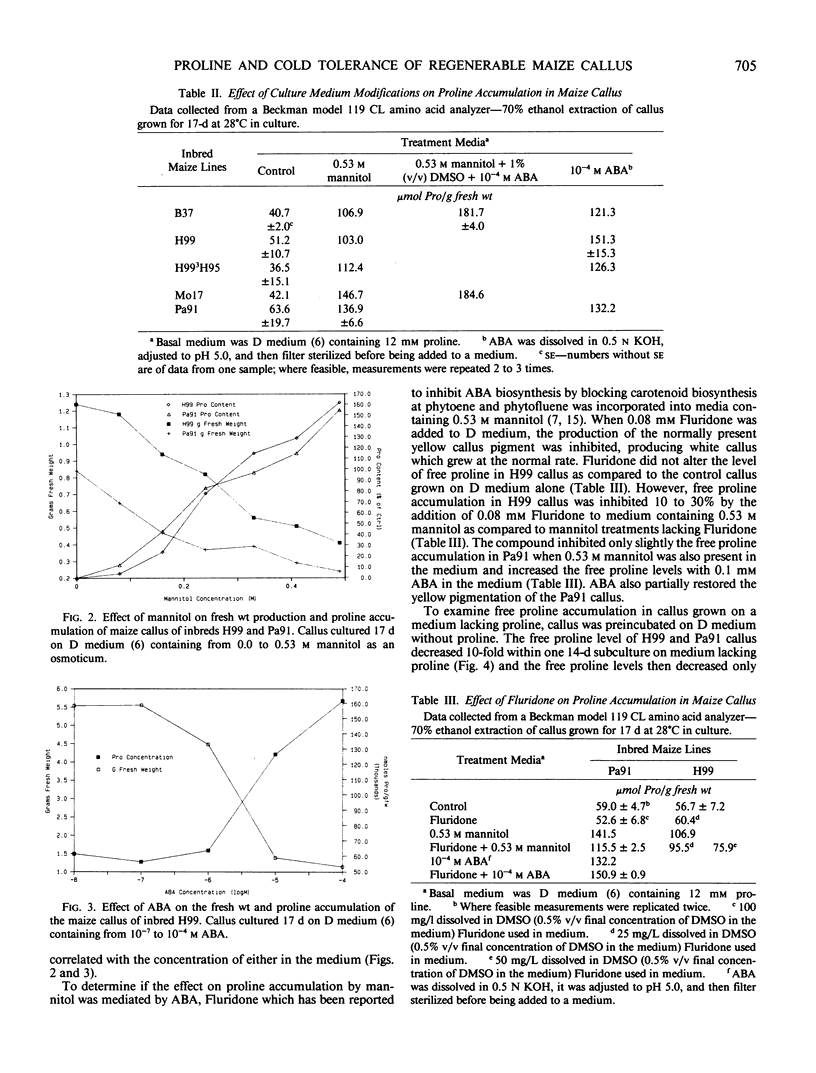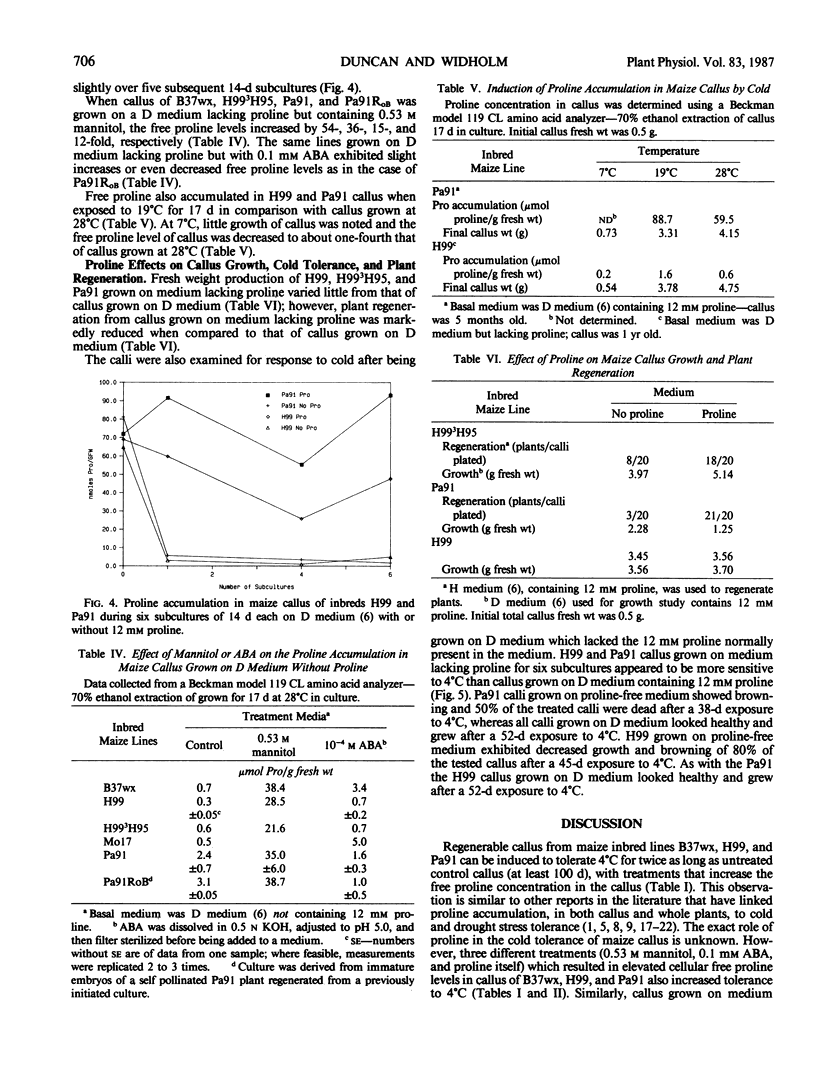Abstract
Embryogenic callus of maize (Zea mays L.) inbreds B37wx, H99, H993H95, Mo17, and Pa91 accumulated proline to levels 2.1 to 2.5 times that of control callus when subjected to mannitol-induced water stress, cool temperatures (19°C) and abscisic acid (ABA). A combination of 0.53 molar mannitol plus 0.1 millimolar ABA induced a proline accumulation to about 4.5 times that of control callus, equivalent to approximately 0.18 millimoles proline per gram fresh weight of callus. Proline accumulation was directly related to the level of mannitol in the medium. Levels of ABA greater than 1.0 micromolar were required in the medium to induce proline accumulation comparable to that induced by mannitol. Mannitol and ABA levels that induced maximum accumulation of proline also inhibited callus growth and increased tolerance to cold. Proline (12 millimolar) added to the culture media also increased the tolerance of callus to 4°C. The increased cold tolerance induced by the combination of mannitol and ABA has permitted the storage of the maize inbreds A632, A634Ht, B37wx, C103DTrf, Fr27rhm, H99, Pa91, Va35, and W117Ht at 4°C for 90 days which is more than double the typical survival time of callus. These studies show that proline and conditions which induce proline accumulation increase the cold tolerance of regenerable maize callus.
Full text
PDF





Images in this article
Selected References
These references are in PubMed. This may not be the complete list of references from this article.
- Bhaskaran S., Smith R. H., Newton R. J. Physiological changes in cultured sorghum cells in response to induced water stress : I. Free proline. Plant Physiol. 1985 Sep;79(1):266–269. doi: 10.1104/pp.79.1.266. [DOI] [PMC free article] [PubMed] [Google Scholar]
- Chen H. H., Li P. H., Brenner M. L. Involvement of abscisic Acid in potato cold acclimation. Plant Physiol. 1983 Feb;71(2):362–365. doi: 10.1104/pp.71.2.362. [DOI] [PMC free article] [PubMed] [Google Scholar]
- Chen T. H., Gusta L. V. Abscisic Acid-induced freezing resistance in cultured plant cells. Plant Physiol. 1983 Sep;73(1):71–75. doi: 10.1104/pp.73.1.71. [DOI] [PMC free article] [PubMed] [Google Scholar]
- Keith C. N., McKersie B. D. The Effect of Abscisic Acid on the Freezing Tolerance of Callus Cultures of Lotus corniculatus L. Plant Physiol. 1986 Mar;80(3):766–770. doi: 10.1104/pp.80.3.766. [DOI] [PMC free article] [PubMed] [Google Scholar]
- Moore R., Smith J. D. Growth, graviresponsiveness and abscisic-acid content of Zea mays seedlings treated with fluridone. Planta. 1984;162:342–344. [PubMed] [Google Scholar]
- Stewart C. R., Voetberg G. Relationship between Stress-Induced ABA and Proline Accumulations and ABA-Induced Proline Accumulation in Excised Barley Leaves. Plant Physiol. 1985 Sep;79(1):24–27. doi: 10.1104/pp.79.1.24. [DOI] [PMC free article] [PubMed] [Google Scholar]
- Watad A. E., Reinhold L., Lerner H. R. Comparison between a Stable NaCl-Selected Nicotiana Cell Line and the Wild Type : K, Na, and Proline Pools as a Function of Salinity. Plant Physiol. 1983 Nov;73(3):624–629. doi: 10.1104/pp.73.3.624. [DOI] [PMC free article] [PubMed] [Google Scholar]
- Withers L. A., King P. J. Proline: A Novel Cryoprotectant for the Freeze Preservation of Cultured Cells of Zea mays L. Plant Physiol. 1979 Nov;64(5):675–678. doi: 10.1104/pp.64.5.675. [DOI] [PMC free article] [PubMed] [Google Scholar]




